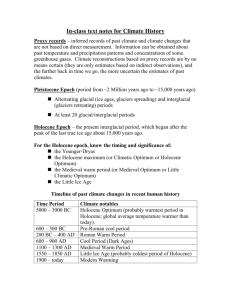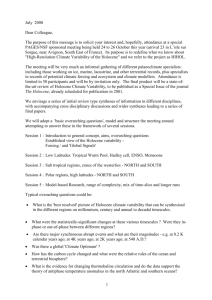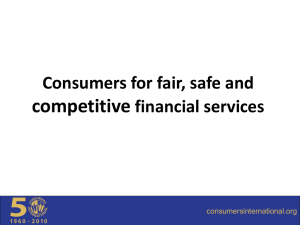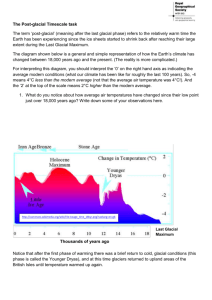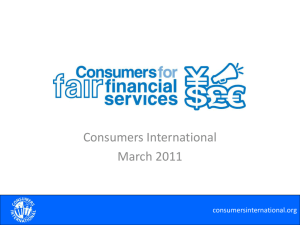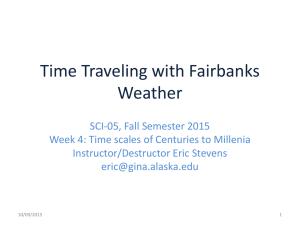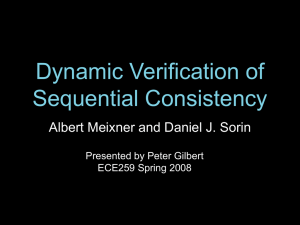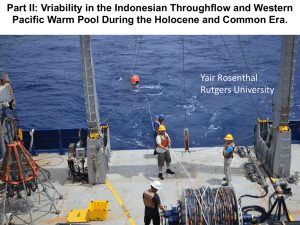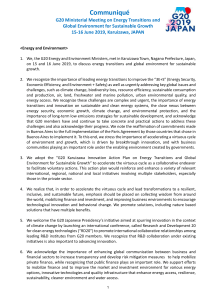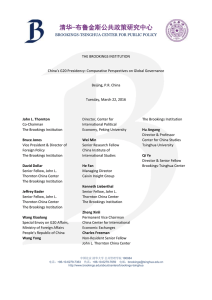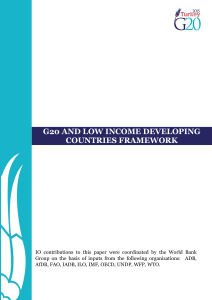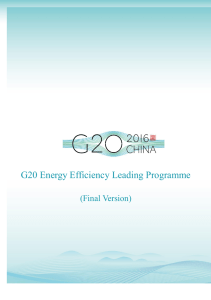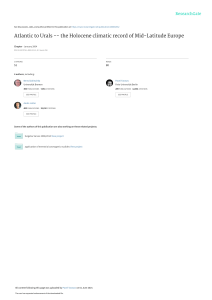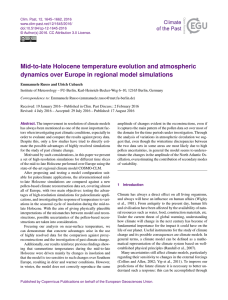University of Cranfield Thursday 6 May 2010 Crispin Tickell
advertisement
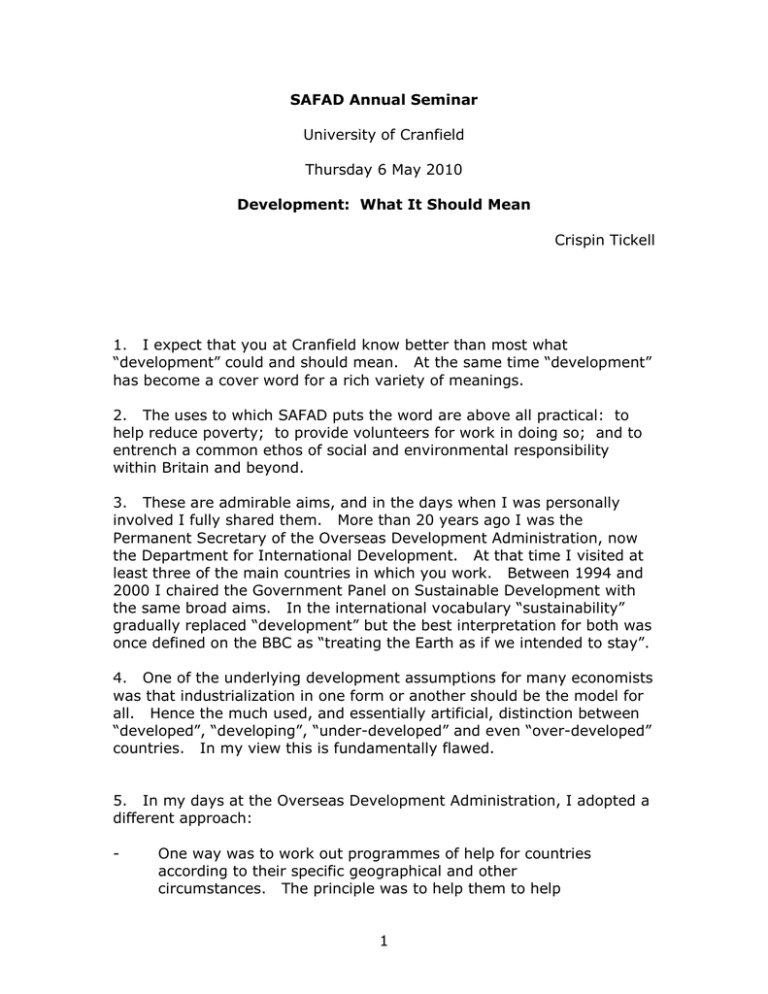
SAFAD Annual Seminar University of Cranfield Thursday 6 May 2010 Development: What It Should Mean Crispin Tickell 1. I expect that you at Cranfield know better than most what “development” could and should mean. At the same time “development” has become a cover word for a rich variety of meanings. 2. The uses to which SAFAD puts the word are above all practical: to help reduce poverty; to provide volunteers for work in doing so; and to entrench a common ethos of social and environmental responsibility within Britain and beyond. 3. These are admirable aims, and in the days when I was personally involved I fully shared them. More than 20 years ago I was the Permanent Secretary of the Overseas Development Administration, now the Department for International Development. At that time I visited at least three of the main countries in which you work. Between 1994 and 2000 I chaired the Government Panel on Sustainable Development with the same broad aims. In the international vocabulary “sustainability” gradually replaced “development” but the best interpretation for both was once defined on the BBC as “treating the Earth as if we intended to stay”. 4. One of the underlying development assumptions for many economists was that industrialization in one form or another should be the model for all. Hence the much used, and essentially artificial, distinction between “developed”, “developing”, “under-developed” and even “over-developed” countries. In my view this is fundamentally flawed. 5. In my days at the Overseas Development Administration, I adopted a different approach: - One way was to work out programmes of help for countries according to their specific geographical and other circumstances. The principle was to help them to help 1 themselves, and make best use of their own resources. We avoided any application of universal criteria. In other words we aimed for what we might call "appropriate development" (the very phrase used in SAFAD). - Another was to bring in environmental impact assessments of all projects to know what was feasible and beneficial over the long as well as short term. 6. Let us now look at the bigger picture. I think we must recognize that the current situation of our society is unique. Other societies and civilizations have collapsed before, for environmental and other reasons, but the circumstances of today are new. They go back to the beginning of the industrial revolution some 250 years ago. 7. In September 2009 the magazine Nature published an article by Johan Rockstrom and others identifying nine scientific stops or boundaries which human would cross at their peril. Three had already been crossed: climate change; loss of biodiversity; and interference with nitrogen and phosphorus levels. The other six were: atmospheric ozone depletion; ocean acidification; use of fresh water; changes in land use; chemical pollution; and atmospheric aerosol loading. 8. But these stops, however important, are only part of the story. are some others: - Human proliferation: one animal species out of control; - Degradation of land, consumption of often irreplaceable resources, accumulation of wastes; - Dependence on energy from diminishing stocks of fossil fuels, whose combustion is doing increasing damage to the atmosphere; - Destabilization of climate world wide so far with unknown results, including sea level rise and increasing food insecurity; - Following on from that, changes in the distribution of water, and pollution of both salt and fresh water; - Destruction of other species and damage to ecosystems, also with unknown results, especially for human health. 2 Here 9. These factors, together and separately, affect everything we do, and above all why we do it. We live in a consumer society, and thinking differently means thinking about consumerism and the role of markets. 10. What are my priorities? - First we must recognize that whatever you may hear from some politicians, there is no such thing as a free market, and never has been. All markets operate within rules, whether explicit or implicit, which together constitute a framework which, if it is any good, should be in the public interest and to the public good; - We have to rethink a lot of economics: how we measure wealth, welfare and the health of the human condition. At present we continue to fail to bring in externalities and true costs in our system of measurement. As has been well said, markets are marvellous at fixing prices but incapable of recognizing costs. The shortcomings of “growth”, GDP/GNP etc are at last being recognized, together with the artificiality of much cost benefit analysis; - New efforts are being made to establish new more rational systems of measurement: for example: - the Human Development Index; - the work of the New Economics Foundation; - the Commission established by President Sarkozy and chaired by Joseph Stiglitz and Amartya Sen whose recently published report suggested new methodologies. 11. The importance of the environment is critical in all aspects of progress, change and development. First we should recognize that the economy is the wholly-owned subsidiary of the environment. The damage we are now doing to the Earth requires a profound change of mind. Already some of the message is coming through from 3 governments, universities, corporations and local communities. The focus has been on climate change but climate change has to be seen in the broadest context: - We have the Fourth Assessment of the Intergovernmental Panel on Climate Change of 2007 which, although criticized on one or two details, well lays out the science; - We have the Stern Review of the same year, and subsequent work on the social and economic impacts; and of course Al Gore in his book and film “An Inconvenient Truth”; - There was the report of the United Nations Environment Programme (UNEP) announced in March last year which laid out the foundations of what was called a Global Green New Deal. 12. It was against this background that the conference on climate change (COP 15) took place in Copenhagen last December. The results were, as everyone knows, disappointing, although it was not the disaster it has sometimes been portrayed. Some positive measures have already come out of it. An important lesson from it is the difficulty in persuading the whole international community to agree to a wide variety of politically difficult commitments and actions. One of the lessons we may draw is the need for what has been called plurality of agreements, in other words groups of countries which can agree among themselves on certain measures, and later try to fit them within a global famework. 13. The proposals for a Global Green New Deal, which has since been discussed among the G20 leaders, is a good example. This brought out the practical implications of what development could and should mean: to stimulate economic recovery, create employment, reduce poverty, and lessen dependency on fossil fuels, in short to tackle environmental degradation of all kinds. According to an article in Nature of 8 April, the G20 account for two-thirds of the world’s population, 90% of global economic activity and at least three-quarters of global greenhouse gas emissions. 4 14. So far the G20 may have failed to deliver on their promises at their Pittsburgh meeting in September 2009. But the directions they aim to follow in the future are now clearer than ever. So far as initiatives in green technology are concerned, the world leaders are now China and South Korea, and the rest of the world, including the United States and the European Union, are behind. The emphasis has been on solar, wind, transport and other renewal energy systems. All governments face a major responsibility in determining the right incentives and disincentives within their countries, getting rid of perverse subsidies, and of course in working so far as possible within a coordinated global framework. 15. Before I conclude I want to mention an enterprise in which I am involved which brings out the sheer scale of the problems facing the Earth. In geological terms the Pleistocene epoch of the ice ages was followed some ten thousand years ago by the Holocene epoch. The Holocene has been marked by relatively warm conditions in the climate of our planet. Now it is proposed that the Holocene should be followed by an Anthropocene epoch to mark the extraordinary changes begun by the industrial revolution some 250 years ago. These changes were caused by one animal species - ourselves - which has transformed the condition of the surface of the Earth. That is where we are today. 16. A final word on SAFAD. One of the most difficult tasks which SAFAD has undertaken in the past is to persuade the public in general and individuals in particular of the kind of crisis now facing the world and of the role that we must all play in doing something about it. I commend the Global Green New Deal to you as one of the somewhat neglected papers in this story, and a powerful guide to development in the best sense of the word. We need to be articulate and sometimes courageous in persuading people of the nature of the problems we now face, and of the urgency for corrective action. SAFAD is already playing its part above all by showing what can be done in practical terms. 17. I am sometimes asked: What’s in it for me, my university, my business, my society? In the long run the answer is simple. Survival. 5
